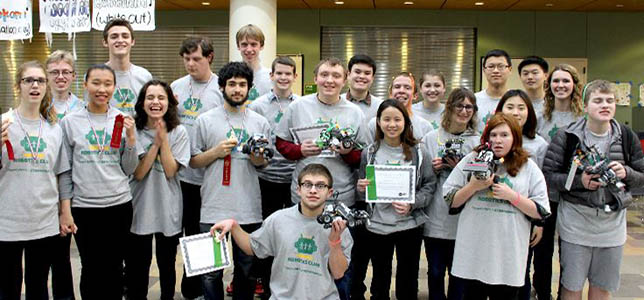Inclusive Education Inspires Good Student Citizenship
Research has shown that exposure to those with backgrounds different from our own makes us more creative and hard working, and it actually makes us smarter. Having an understanding that others will have opposing or varying points of view changes how we approach problems, voice concerns and propose suggestions. By instilling these values in our students and offering opportunities for them to work with others, educators can inspire them to be good global citizens and prepare them for success in their professional lives.

The Unified Robotics teams connects every student to STEM.
Inclusive education gives children of all backgrounds, races and genders the opportunity to learn and interact together. Using inclusive STEM education, educators can benefit all students, not just their learning- or behavior-challenged peers. STEM learning opportunities, especially hands-on programs like robotics, are especially valuable in the classroom. They enable students to problem solve, work with others and develop a slew of critical thinking skills.
Across the country, there are students and educators making an impact in their communities, going above and beyond to provide meaningful, rewarding learning opportunities to students of all backgrounds and abilities:
- DECENT: When Karin Fisher, an autism educator, started a FIRST (For Inspiration and Recognition of Science and Technology) robotics team at her son’s school for students on the autism spectrum, she was faced with the normal challenges of launching a team as well as the need to find meaningful and engaging ways to present complex robotics concepts to her team members. With help from local professional mentors and students from a nearby FIRST team, Karin’s team builds robots and participates in competitions, giving the students valuable exposure to social situations and requiring them to use their creativity and problem-solving skills.
- CyberKnights/Unified Robotics: When Delaney Foster’s learning-challenged sister expressed interest in robotics, Delaney created Unified Robotics, a program to bring STEM to more high school students, including those often excluded from extracurricular activities due to learning or behavior challenges. Small teams create their own Lego Mindstorms robots (including designing, building and programming), and compete in a tournament-style competition where they play a game that changes annually. Delaney is working with the Special Olympics to bring Unified Robotics to the national level and she is working to have it recognized as a sanctioned high school sport.
- NERA Deaf and Hard of Hearing Reverse Inclusion Teams: Using a STEM Equity Community Innovation Grant from FIRST, the Iowa School for the Deaf is launching a “reverse inclusion” program where teams will be started by deaf and hard-of-hearing students in mainstreamed settings and others will be invited to participate.
By giving students the opportunity to work with others, experience their differences and put their education to work, educators are giving kids valuable life experience that will make them better global citizens.
To learn more about how educators are giving underserved and underrepresented students valuable access to hands-on and collaborative learning opportunities, read more about the 2016 FIRST STEM Equity Community Innovation Grant winners, and apply for a 2017 grant here.
About the Author
Jamie Sachs is the director of education for FIRST (For Inspiration and Recognition of Science and Technology), an international youth organization that operates the FIRST Robotics Competition, FIRST Lego League Jr. and other student competitions that aim to engage students in STEM learning.